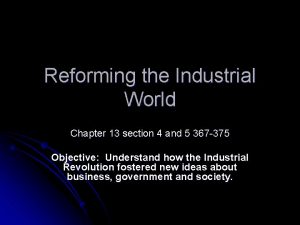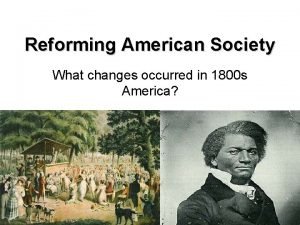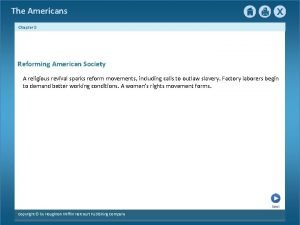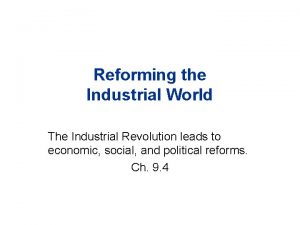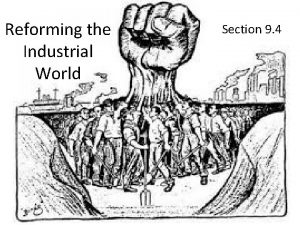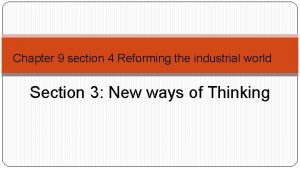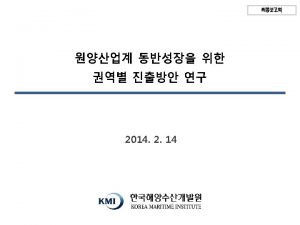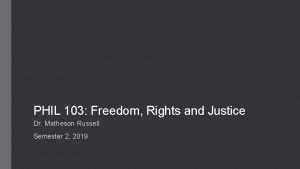Reforming Government in OECD Countries Alex Matheson OECD













- Slides: 13

Reforming Government in OECD Countries Alex Matheson, OECD Paris Visit to Seoul, May 2004

Most Important Question • What is the Problem ?

Why is Problem Definition Important? • There is no model of reform –depends on nations’s problems and circumstances. • Changing rules and structures does not necessarily change behaviour • Behavioural and value changes take time , a range of levers, and focused attention by management

eg -Does Government need • Stronger Collectivity? (eg. Policy co- ordination, budget stability, legal compliance, impartiality, protections against vested interests, management control, uniform civil service system, . . . ) • or More Adaptivity? (eg. Performance, competition, differentiated structures, tailored services/incentives, risk-taking, . . . )

Does reform strategy take account of • • Economic Situation Influence of unionised labour Public attitudes to government Constitutional arrangements Vested interests National culture National Institutional capacity

Modernisation Trends • Public management policy more politically important • Devolution to lower levels of government • Use of third party providers • Greater transparency and consultation re services • Use of budget in more strategic role • Changing nature of public employment

And In Several Countries • agencification; • targets indicators and formalisation of performance, • reforms of role of central control agencies • attention to leadership

Contemporary Reforms • Are Systemic not Instrumental • Devolves rather than centralises authority. • Addresses Incentives not just Rules

Problems • Rhetoric • Smorgasbord • Stopping short of culture change • Redundancy of process

Cultural Fit: Key Variables • Incentives individual or collective? • Senior management perspective whole of government or departmental? • Appointments by public service or politicians? • Control- ex ante/ ex post External/ Internal • Public Service status high or low? • Parliamentary oversight weak or strong?

Reforming the management of senior managers Challenges and unresolved issues • How to reconcile the need for specialised skills and the need for coherence and cohesion? How to prevent an elite group from serving its own interest? And without threatening its own cohesion? • What is the future of individual accountability for performance?

The Performance Movement. . • Ambitious policies mean sophisticated measurement • Targets, measures and performance important- but beware instrument fixation • Did not replace input or process controls • Creates challenges for external control • Has exaggerated notion of what can be routinised • Performance enhancing strategies need variety of sticks and carrots , formal and social influences, sustained over time.

Emerging Issues • • • Strategic management with less control Use and Abuse of the power of persuasion Fragmentation of civil service culture Declining trust in Public Institutions Governance of Inter-governmental bodies -and of non-governmental bodies
 Button button character traits
Button button character traits Oecd countries
Oecd countries Chapter 8 section 1 religion sparks reform
Chapter 8 section 1 religion sparks reform Chapter 25 section 4 reforming the industrial world
Chapter 25 section 4 reforming the industrial world Catalytic reforming of hexane
Catalytic reforming of hexane Catalytic reforming bottleneck
Catalytic reforming bottleneck Reforming american society
Reforming american society Steam methane reforming ppt
Steam methane reforming ppt Chapter 8 reforming american society
Chapter 8 reforming american society Reforming the industrial world
Reforming the industrial world Kraking
Kraking Chapter 9 section 4 reforming the industrial world
Chapter 9 section 4 reforming the industrial world Chapter 9 section 4 reforming the industrial world
Chapter 9 section 4 reforming the industrial world Reforming the industrial world chapter 9 section 4
Reforming the industrial world chapter 9 section 4


